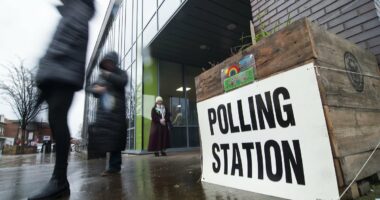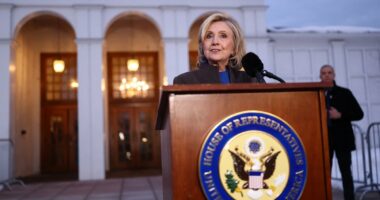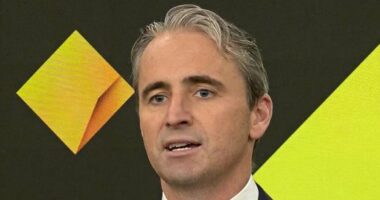Share this @internewscast.com
In a recent development, Donald Trump has proposed issuing $2,000 rebate checks to Americans, an idea that has gained support from top economic advisor Kevin Hassett.
Kevin Hassett, who leads the National Economic Council, announced during a press briefing that the federal revenue generated from Trump’s tariff policies could potentially fund these checks without impacting the federal budget.
Despite the availability of funds, Hassett emphasized that legislative approval from Congress is necessary for these checks to be distributed by the federal government.
Addressing inquiries about cooperation with Congress to pass the required legislation, Hassett mentioned on Thursday that the administration is actively examining the issue, ensuring that all necessary data is in place for the president to make an informed decision.
However, it remains uncertain whether the administration will be able to deliver these rebates and when Americans might receive them.
The Daily Mail has requested comments from both the White House and the Department of the Treasury regarding this proposal.
The president initially floated the checks in a post on Truth Social last week. He wrote in a post that a dividend of at least $2,000 would be paid to lower and moderate-income earners due to the success of tariffs.
Trump boasted that those against his controversial tariff policy are ‘fools’ and that America was the richest, most respected country in the world.

Director of the National Economic Council Kevin Hassett told reporters this week that there was enough money to send rebate checks to Americans

Trump took to Truth Social last week where he initially floated the idea for $2,000 rebate checks for Americans making lower or moderate incomes
During a White House press briefing on Wednesday, Press Secretary Karoline Leavitt told reporters that the president was ‘committed’ to sending checks to Americans.
She added that Trump’s economic advisors were looking into the matter and exploring all legal options to send the checks.
However, Leavitt was unable to provide a timeline for the checks and stated that the administration would provide an update when one is available.
The checks would require approval from Congress, and Republicans hold a slim majority following the midterm elections.
Fiscally conservative members told Politico that they were skeptical of the rebates, with Representative Ryan Zinke saying: ‘We’re $36, $37 trillion in debt. To me, I think our bus is full.
‘If you want to add something, then take something off the bus. That’s just me.’
Representative Tim Burchett told the publication that he was unsure as to whether he’d vote to support the rebates.
‘I’d have to see how it affected the debt,’ he said.

Hassett acknowledged that the administration would need Congressional approval to send the rebates. Hassett (right) with Treasury Secretary Scott Bessent (left)
‘People are hurting and it’s clear that the tariffs … it’s going to cause some pain. But I think we will turn the corner on it.’
Representative Andy Harris also said he didn’t know if he’d support the legislation, telling Politico: ‘If I paid attention to every single thing the president said, I’d have no other time in my day.’
The last time the federal government sent rebate checks to Americans was during the Covid-19 pandemic under the Biden administration.
Some Republicans cited the stimulus package as a contributing factor to record-high inflation rates at the time.
Republicans on the House Committee on Oversight and Accountability issued a press release in 2023, blaming the Biden administration for ignoring warnings that excessive spending would harm the economy.

Trump shared the news of the checks on Truth Social on November 9
Inflation has decreased since reaching record highs in 2022, but has remained at around three percent this year, according to data from the US Bureau of Labor Statistics.
Trump’s tariff policy has drawn criticism, and two cases were recently heard at the Supreme Court questioning the legality of the president’s decision to impose emergency powers to implement the tax.
An analysis of the policy from the Tax Foundation concluded that: ‘Historical evidence and recent studies show that tariffs are taxes that raise prices and reduce available quantities of goods and services for US businesses and consumers, resulting in lower income, reduced employment, and lower economic output.’
However, the Trump administration has maintained that tariffs have helped the economy, issuing a press release on Friday, which states that prices have decreased since the president assumed office.

















